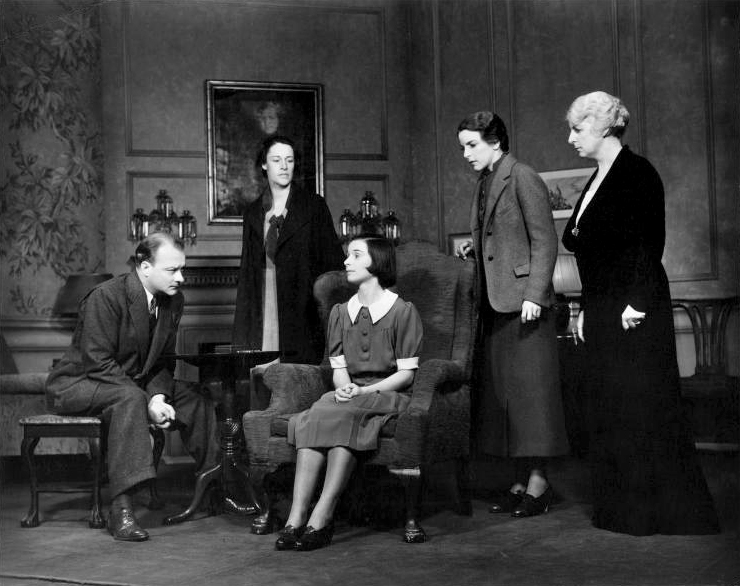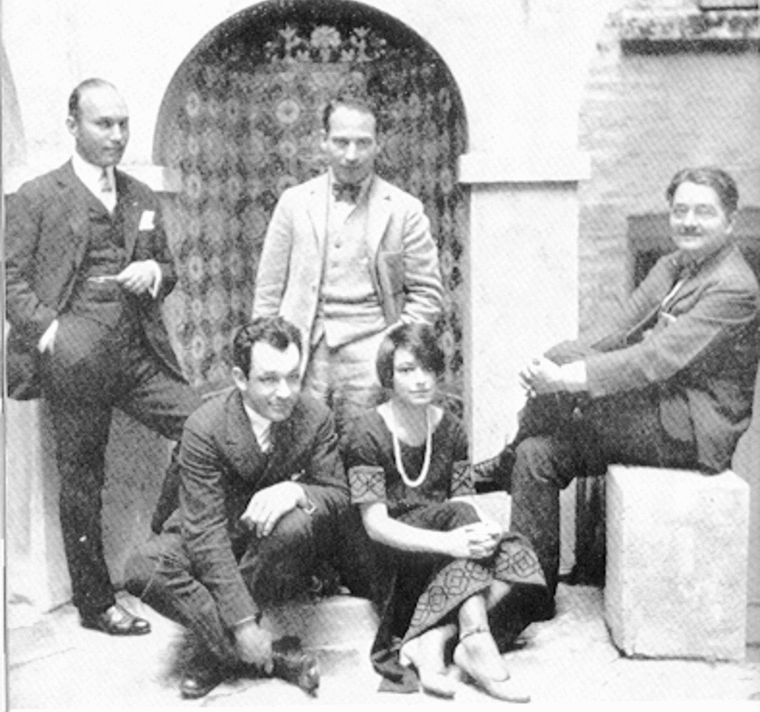|
Red Channels
''Red Channels: The Report of Communist Influence in Radio and Television'' was an anti-Communist document published in the United States at the start of the 1950s. Issued by the right-wing journal ''Counterattack'' on June 22, 1950, the pamphlet-style book names 151 actors, writers, musicians, broadcast journalists, and others in the context of purported Communist manipulation of the entertainment industry. Some of the 151 were already being denied employment because of their political beliefs, history, or association with suspected subversives. ''Red Channels'' effectively placed the rest on a blacklist. ''Counterattack'' In May 1947, Alfred Kohlberg, an American textile importer and an ardent member of the anti-Communist China Lobby, funded an organization, led by three former FBI agents, called American Business Consultants Inc., which issued a newsletter, ''Counterattack.'' Kohlberg was also an original national council member of the John Birch Society. A special report, ... [...More Info...] [...Related Items...] OR: [Wikipedia] [Google] [Baidu] |
Orson Welles
George Orson Welles (May 6, 1915 – October 10, 1985) was an American actor, director, producer, and screenwriter, known for his innovative work in film, radio and theatre. He is considered to be among the greatest and most influential filmmakers of all time. While in his 20s, Welles directed high-profile stage productions for the Federal Theatre Project, including an adaptation of ''Macbeth'' with an entirely African-American cast and the political musical '' The Cradle Will Rock''. In 1937, he and John Houseman founded the Mercury Theatre, an independent repertory theatre company that presented a series of productions on Broadway through 1941, including '' Caesar'' (1937), an adaptation of William Shakespeare's '' Julius Caesar''. In 1938, his radio anthology series '' The Mercury Theatre on the Air'' gave Welles the platform to find international fame as the director and narrator of a radio adaptation of H. G. Wells's novel '' The War of the Worlds'', which cau ... [...More Info...] [...Related Items...] OR: [Wikipedia] [Google] [Baidu] |
Counterattack (newsletter)
''Counterattack'' was a weekly subscription-based, anti-communist, mimeographed newsletter, which ran from 1947 to 1955 and was published by a "private, independent organization" of the same name and started by three ex-Federal Bureau of Investigation agents. Formation In May 1947, "a group of former FBI agents" founded a "private, independent organization" called Counterattack. Description The full title of the publication was ''Counterattack: The Newsletter of Facts on Communism''. The weekly subscription-based newsletter headquartered at 55 W. 42 Street, New York. ''Counterattack'' was available by subscription and on news stands and in stores for one dollar in New York City. An annual subscription cost $24. Its target subscribers included "Security Officers, Personnel Directors, Employment managers and all sorts of people whose business requires them to know the facts about the background of organizations and/or individuals." By 1949, ''Counterattack'' had ... [...More Info...] [...Related Items...] OR: [Wikipedia] [Google] [Baidu] |
Hollywood Blacklist
The Hollywood blacklist was an entertainment industry Blacklisting, blacklist, broader than just Hollywood, put in effect in the mid-20th century in the United States during the early years of the Cold War. The blacklist involved the practice of denying employment to entertainment industry professionals believed to be or to have been Communism, Communists or sympathizers. Actors, screenwriters, Film director, directors, film score, musicians, and other American entertainment professionals were barred from work by the studios. This was usually done on the basis of their membership in, alleged membership in, or sympathy with the Communist Party USA, or on the basis of their refusal to assist Congressional investigations into the party's activities. Even during the period of its strictest enforcement, from the late 1940s through to the late 1950s, the blacklist was rarely made explicit or easily verifiable, as it was the result of numerous individual decisions by the studios and was ... [...More Info...] [...Related Items...] OR: [Wikipedia] [Google] [Baidu] |
Lillian Hellman
Lillian Florence Hellman (June 20, 1905 – June 30, 1984) was an American playwright, prose writer, memoirist and screenwriter known for her success on Broadway, as well as her communist sympathies and political activism. She was blacklisted after her appearance before the House Committee on Un-American Activities (HUAC) at the height of the anti-communist campaigns of 1947–1952. Although she continued to work on Broadway in the 1950s, her blacklisting by the American film industry caused a drop in her income. Many praised Hellman for refusing to answer questions by HUAC, but others believed, despite her denial, that she had belonged to the Communist Party. As a playwright, Hellman had many successes on Broadway, including '' Watch on the Rhine'', '' The Autumn Garden'', '' Toys in the Attic'', '' Another Part of the Forest'', '' The Children's Hour'' and '' The Little Foxes''. She adapted her semi-autobiographical play ''The Little Foxes'' into a screenplay, which starred Be ... [...More Info...] [...Related Items...] OR: [Wikipedia] [Google] [Baidu] |
Dorothy Parker
Dorothy Parker (née Rothschild; August 22, 1893 – June 7, 1967) was an American poet, writer, critic, and satirist based in New York; she was known for her wit, wisecracks, and eye for 20th-century urban foibles. From a conflicted and unhappy childhood, Parker rose to acclaim, both for her literary works published in magazines, such as ''The New Yorker,'' and as a founding member of the Algonquin Round Table. Following the breakup of the circle, Parker traveled to Hollywood to pursue screenwriting. Her successes there, including two Academy Award nominations, were curtailed when her involvement in left-wing politics resulted in her being placed on the Hollywood blacklist. Dismissive of her own talents, she deplored her reputation as a "wisecracker." Nevertheless, both her literary output and reputation for sharp wit have endured. Some of her works have been set to music; adaptations included the operatic song cycle '' Hate Songs'' by composer Marcus Paus. Early life and ... [...More Info...] [...Related Items...] OR: [Wikipedia] [Google] [Baidu] |
Edward G
Edward is an English given name. It is derived from the Anglo-Saxon name ''Ēadweard'', composed of the elements '' ēad'' "wealth, fortune; prosperous" and '' weard'' "guardian, protector”. History The name Edward was very popular in Anglo-Saxon England, but the rule of the Norman and Plantagenet dynasties had effectively ended its use amongst the upper classes. The popularity of the name was revived when Henry III named his firstborn son, the future Edward I, as part of his efforts to promote a cult around Edward the Confessor, for whom Henry had a deep admiration. Variant forms The name has been adopted in the Iberian peninsula since the 15th century, due to Edward, King of Portugal, whose mother was English. The Spanish/Portuguese forms of the name are Eduardo and Duarte. Other variant forms include French Édouard, Italian Edoardo and Odoardo, German, Dutch, Czech and Romanian Eduard and Scandinavian Edvard. Short forms include Ed, Eddy, Eddie, Ted, Teddy an ... [...More Info...] [...Related Items...] OR: [Wikipedia] [Google] [Baidu] |
General Foods
General Foods Corporation was a company whose direct predecessor was established in the United States by Charles William Post as the Postum Cereal Company in 1895. The company changed its name to "General Foods" in 1929, after several corporate acquisitions, by Marjorie Post after she inherited the established cereal business from her father C. W. Post. In November 1985, General Foods was acquired by Philip Morris Companies (now Altria Group, Inc.) for $5.6 billion, the largest non-oil acquisition to that time. In December 1988, Philip Morris acquired Kraft Foods Inc., and, in 1990, combined the two food companies as Kraft Foods. "General Foods" was dropped from the corporate name in 1995; a line of caffeinated hot beverage mixes continued to carry the General Foods International name until 2010. History Background General Foods background can be traced to the Post Cereal Company, founded by C. W. Post in 1895 in Battle Creek, Michigan. Post was a patient at the Bat ... [...More Info...] [...Related Items...] OR: [Wikipedia] [Google] [Baidu] |
The Aldrich Family
''The Aldrich Family'', a popular radio teenage situation comedy (July 2, 1939 – April 19, 1953), was also presented in films, television and comic books. In the radio series' opening exchange, awkward teen Henry's mother called, "Hen-''reeeeeeeeeeeee!'' Hen-ree ''Al''-drich!", and he responded with a breaking adolescent voice, "''Com''-ing, Mother!" The creation of playwright Clifford Goldsmith, Henry Aldrich began on Broadway as a minor character in Goldsmith's play '' What a Life''. Produced and directed by George Abbott, ''What a Life'' ran for 538 performances (April 13, 1938 to July 8, 1939). The Broadway cast included Eddie Bracken, Betty Field and Butterfly McQueen. The actor who brought Henry to life on stage was 20-year-old Ezra Stone, who was billed near the bottom as the 20th actor in the cast. Stone was also employed as the play's production assistant. ''Time'' magazine found the play "short on plot" but noted: Radio When Rudy Vallee saw the play, he a ... [...More Info...] [...Related Items...] OR: [Wikipedia] [Google] [Baidu] |
Communist
Communism (from Latin la, communis, lit=common, universal, label=none) is a far-left sociopolitical, philosophical, and economic ideology and current within the socialist movement whose goal is the establishment of a communist society, a socioeconomic order centered around common ownership of the means of production, distribution, and exchange which allocates products to everyone in the society.: "One widespread distinction was that socialism socialised production only while communism socialised production and consumption." Communist society also involves the absence of private property, social classes, money, and the state. Communists often seek a voluntary state of self-governance, but disagree on the means to this end. This reflects a distinction between a more libertarian approach of communization, revolutionary spontaneity, and workers' self-management, and a more vanguardist or communist party-driven approach through the development of a constitutional socialist ... [...More Info...] [...Related Items...] OR: [Wikipedia] [Google] [Baidu] |
Jean Muir (actress)
Jean Muir (born Jean Muir Fullarton; February 13, 1911 – July 23, 1996) was an American stage and film actress and educator. She was the first performer to be blacklisted after her name appeared in the anti-Communist 1950 pamphlet ''Red Channels''. Early years An only child, Muir was born in Suffern, New York as Jean Muir Fullarton; her father was a certified public accountant, and her mother was a substitute teacher.Vosburgh, DickObituary: Jean Muir ''The Independent'', August 2, 1996. Retrieved 2013-06-08. She attended the Dwight School in Englewood, New Jersey. Career Muir's Broadway debut came in ''The Truth Game'' (1930) at age 19. She was a model for the Walter Thornton Model Agency in New York during the early 1930s. She was signed by Warner Bros. in 1933 and made 14 films in her first three years there. She played opposite several famous actors including Warren William, Paul Muni, Richard Barthelmess and Franchot Tone, but she returned to Broadway in 1937 because sh ... [...More Info...] [...Related Items...] OR: [Wikipedia] [Google] [Baidu] |
Spanish Civil War
The Spanish Civil War ( es, Guerra Civil Española)) or The Revolution ( es, La Revolución, link=no) among Nationalists, the Fourth Carlist War ( es, Cuarta Guerra Carlista, link=no) among Carlism, Carlists, and The Rebellion ( es, La Rebelión, link=no) or The Uprising ( es, La Sublevación, link=no) among Republicans. was a civil war in Spain fought from 1936 to 1939 between the Republican faction (Spanish Civil War), Republicans and the Nationalist faction (Spanish Civil War), Nationalists. Republicans were loyal to the left-leaning Popular Front (Spain), Popular Front government of the Second Spanish Republic, and consisted of various socialist, communist, separatist, anarchist, and Republicanism in Spain, republican parties, some of which had opposed the government in the pre-war period. The opposing Nationalists were an alliance of Falangism, Falangists, monarchists, conservatives, and Traditionalism (Spain), traditionalists led by a National Defense Junta, military junt ... [...More Info...] [...Related Items...] OR: [Wikipedia] [Google] [Baidu] |




.jpg)
